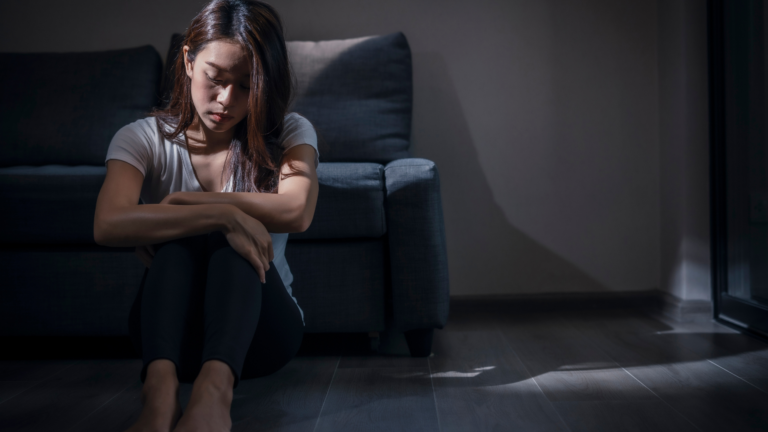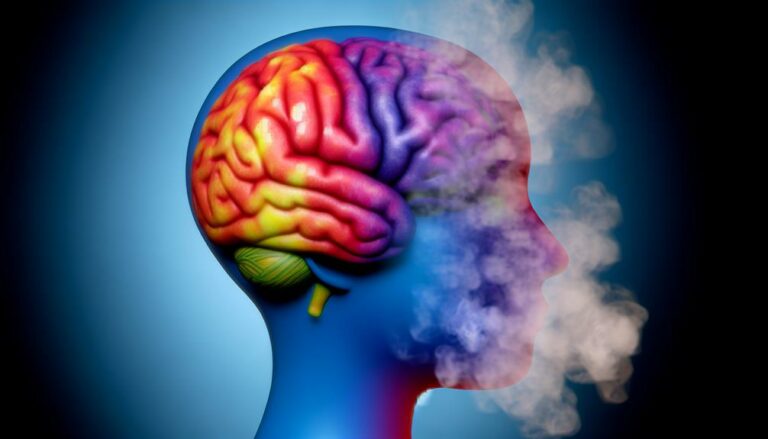You may have heard conflicting views on the use of cannabis for anxiety and depression, but understanding the science behind it is crucial.
When it comes to managing mental health, clarity is key. Exploring the nuanced relationship between cannabis and these conditions can provide valuable insights into potential benefits and risks.
Understanding how different components of cannabis interact with our bodies can shed light on its impact on anxiety and depression.
Stay tuned to uncover the latest findings and considerations regarding cannabis use for mental health purposes.
Table of Contents
Cannabis Impact on Anxiety and Depression: What to Know:
Cannabis and Anxiety: What Research Shows
When considering the impact of cannabis on anxiety, research shows a complex interplay between the plant’s components and individual reactions. Cannabis contains various compounds, with CBD often highlighted for its potential calming effects. However, the relationship between THC, CBD, and anxiety is intricate. While CBD is generally associated with anxiety relief, THC, in some cases, can exacerbate feelings of anxiety or paranoia.
It’s crucial to understand that each person’s response to cannabis is unique. Factors such as dosage, consumption method, and individual biochemistry play significant roles in how cannabis affects anxiety. Some individuals may find cannabis helpful in managing their anxiety symptoms, while others may experience increased anxiety levels.
Research suggests that the key to using cannabis for anxiety lies in finding the right balance of cannabinoids. Consulting with a healthcare provider before using cannabis for anxiety is advisable to ensure a personalized approach that considers your specific needs and potential risks. Remember, what works for one person may not work the same for another when it comes to cannabis and anxiety.
RELATED ARTICLE: What Are the Top Strains for Pain Relief?
Effects of Cannabis on Depression
Navigating the realm of cannabis and its effects on mental health, especially in relation to anxiety, can lead to a deeper understanding of how this plant interacts with various conditions like depression. When it comes to depression, cannabis may have both positive and negative impacts, depending on the individual and the specific strains or products used. Here are some key points to consider:
- Strain Selection: Different strains of cannabis contain varying levels of cannabinoids and terpenes, which can influence the effects on depression. Some strains may exacerbate depressive symptoms, while others could potentially offer mood-enhancing benefits.
- Dosage and Consumption Method: The way you consume cannabis, whether through smoking, vaping, edibles, or oils, can affect how it interacts with your body and mental state. Finding the right dosage and consumption method is crucial in managing depression symptoms.
- Personal Biochemistry: Each person’s biochemistry is unique, meaning responses to cannabis can vary widely. It’s essential to monitor how cannabis affects your mood and overall mental well-being to determine if it’s a suitable option for managing depression.
THC Vs. CBD for Anxiety Relief
Selecting between THC and CBD for anxiety relief can be a crucial decision that requires understanding their distinct effects on mental well-being. THC, the psychoactive component of cannabis, can sometimes exacerbate anxiety symptoms, especially in high doses. It may lead to increased heart rate, paranoia, and heightened anxiety levels in some individuals.
On the other hand, CBD, a non-intoxicating compound, is often preferred for managing anxiety due to its anxiolytic properties. CBD interacts with serotonin receptors in the brain, which can help regulate mood and alleviate anxiety without the euphoric high associated with THC.
When considering THC vs. CBD for anxiety relief, it’s essential to consult with a healthcare professional to determine the best option for your specific needs. Factors such as personal tolerance, the severity of anxiety symptoms, and any underlying medical conditions should be taken into account.
Impact of Cannabis on Mood
Understanding how cannabis impacts mood is essential for individuals seeking to manage their emotional well-being effectively. When it comes to mood, cannabis can have varying effects based on the individual’s unique physiology and the type of strain consumed. Here are three key points to consider:
- THC vs. CBD: The ratio of THC (tetrahydrocannabinol) to CBD (cannabidiol) in a cannabis strain can significantly influence its impact on mood. THC is known for its psychoactive properties that can sometimes lead to feelings of euphoria or anxiety, while CBD is believed to have more calming and mood-stabilizing effects.
- Dosage and Timing: The amount of cannabis consumed and the timing of consumption can also play a crucial role in its impact on mood. Starting with a low dose and gradually increasing can help prevent overwhelming effects on mood.
- Personal Response: Everyone reacts differently to cannabis, so it’s essential to pay attention to how it affects your mood specifically. Keeping a mood journal can help track patterns and identify which strains work best for you.
Cannabis Strains for Anxiety Management
To effectively manage anxiety, exploring specific cannabis strains known for their calming properties can be a valuable starting point. When considering cannabis for anxiety, it’s crucial to focus on strains with high levels of CBD (cannabidiol) and low THC (tetrahydrocannabinol). CBD is renowned for its anxiolytic effects, helping to reduce stress and promote relaxation without the psychoactive ‘high’ associated with THC.
Strains like Harlequin, ACDC, and Ringo’s Gift are popular choices for anxiety management due to their high CBD content. These strains are often recommended for individuals seeking relief from anxiety symptoms while maintaining clarity of mind. Additionally, CBD-dominant strains like Charlotte’s Web have gained recognition for their potential in alleviating anxiety without the intoxicating effects of THC.
It’s essential to consult with a healthcare provider or a knowledgeable budtender to determine the best strain for your specific needs. Finding the right balance of CBD and THC can make a significant difference in managing anxiety effectively with cannabis. Remember, everyone reacts differently to cannabis, so start with low doses and gradually increase as needed to find the optimal strain for your anxiety relief.
Potential Risks of Cannabis Use
Consider the potential risks associated with cannabis use, particularly regarding its impact on mental health and cognitive function. While cannabis can offer therapeutic benefits, it’s essential to be aware of the potential downsides to make informed decisions about your health:
- Mental Health Concerns:
Cannabis use, especially in high doses or with high THC content, may exacerbate anxiety and paranoia in some individuals. It can also lead to the development or worsening of depressive symptoms, particularly in those with a predisposition to mood disorders.
- Cognitive Impairment:
Chronic cannabis use, particularly in adolescence when the brain is still developing, has been linked to cognitive impairments such as memory issues, decreased attention span, and reduced executive functioning. These effects can impact academic or occupational performance.
- Dependency and Addiction:
While not everyone who uses cannabis will develop a dependency, some individuals may experience addictive behaviors with continued use. This can lead to withdrawal symptoms when attempting to stop using the substance, indicating a potential for addiction.
Cannabis as a Treatment Option
When considering cannabis as a treatment option, it’s crucial to understand its efficacy, dosage considerations, and potential side effects.
You’ll find that cannabis can vary in effectiveness for different individuals, so finding the right dosage is key to experiencing its benefits.
Moreover, being aware of possible side effects can help you make informed decisions about incorporating cannabis into your treatment plan.
Efficacy of Cannabis
In exploring the efficacy of cannabis as a treatment option for anxiety and depression, it’s essential to consider its potential benefits and limitations. When considering using cannabis, here are three key points to keep in mind:
- Effectiveness: Research suggests that cannabis may help alleviate symptoms of anxiety and depression in some individuals by interacting with the endocannabinoid system.
- Side Effects: While cannabis shows promise, it can also lead to side effects such as cognitive impairment, increased heart rate, and potential addiction.
- Individual Variability: Responses to cannabis vary widely among individuals, so what works for one person may not work for another. It’s crucial to consult with a healthcare professional to determine the best course of action for your specific situation.
Dosage Considerations
To optimize the benefits of cannabis as a treatment option for anxiety and depression, understanding the appropriate dosage is crucial. When using cannabis for anxiety and depression, finding the right dosage can make a significant difference in its effectiveness. Start low and go slow – this is a common recommendation to gauge your body’s response.
It’s essential to consult with a healthcare provider or a cannabis specialist to determine the ideal dosage based on your individual needs and condition severity. Factors like your weight, metabolism, and tolerance levels play a role in how cannabis affects you. Keeping a journal to track your dosage and its effects can help you fine-tune the amount that works best for managing your anxiety and depression symptoms.
Side Effects Analysis
Consider the potential side effects of utilizing cannabis as a treatment option for anxiety and depression to make an informed decision about its suitability for your individual needs. While cannabis shows promise as a treatment, it’s essential to be aware of possible side effects. Here are some key points to consider:
- Cognitive Impairment: Cannabis can affect memory, concentration, and cognitive function, especially in high doses.
- Dependency Risk: There’s a risk of developing a dependency on cannabis for managing anxiety and depression symptoms.
- Respiratory Issues: Smoking cannabis can lead to respiratory problems similar to those caused by smoking tobacco.
Being informed about these potential side effects will help you weigh the benefits against the risks when considering cannabis as a treatment option.
Frequently Asked Questions
Can Cannabis Worsen Anxiety and Depression Symptoms in Some Individuals?
Yes, cannabis can worsen anxiety and depression symptoms in some individuals. It’s essential to monitor how you feel after using it. If you notice negative effects, consider discussing alternative coping strategies with a healthcare professional.
Are There Any Long-Term Effects of Using Cannabis for Anxiety and Depression Relief?
Long-term cannabis use for anxiety and depression relief may have varying effects. It’s essential to monitor how it impacts your mental health over time. Consulting with a healthcare professional can provide insights tailored to your needs.
How Does Cannabis Interact With Other Medications Used to Treat Anxiety and Depression?
When using cannabis alongside anxiety and depression medications, consult your healthcare provider. Cannabis may interact with these medications, affecting their efficacy or causing side effects. Open communication with your doctor is crucial for your well-being.
Is There a Recommended Dosage or Consumption Method for Using Cannabis to Manage Anxiety and Depression?
When managing anxiety and depression with cannabis, start low and slow. Experiment with different dosages and consumption methods to find what works best for you. Consult with a healthcare professional for personalized guidance.
Are There Any Specific Cannabis Strains or Products That Are More Effective for Treating Anxiety and Depression Compared to Others?
When addressing anxiety and depression with cannabis, some strains and products may offer more effectiveness. It’s essential to explore options like CBD-dominant strains or products with terpenes like linalool for potential benefits in managing symptoms.
Conclusion
In conclusion, while cannabis shows promise in managing anxiety and depression, it’s important to approach its use with caution. Research suggests that CBD may be more beneficial for anxiety relief compared to THC.
Different cannabis strains can also impact mood differently. However, there are potential risks associated with cannabis use, so it’s essential to consult with a healthcare professional before incorporating it into your treatment plan.
Stay informed and make educated decisions about your mental health.




